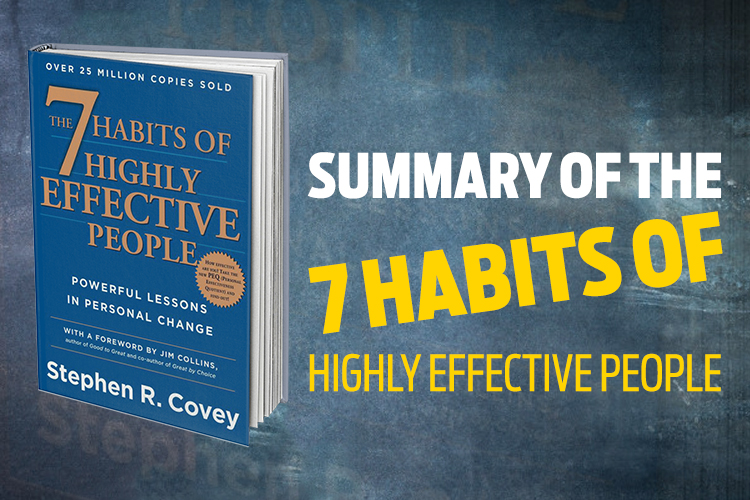Before becoming successful with his book “The 7 habits of highly effective people”, Stephen Covey was a co-founder of the Franklin Covey Company and provided training services to various leading international organizations. He held a BSc degree in Business Administration from the University of Utah in Salt Lake City. From Harvard University, he completed his MBA in Business Administration and a doctorate (PhD) from the Brigham Young University.
Stephen Covey sold over 20 million books and his book, the 7 habits of highly effective people, was elected as the most influential book of the twentieth century. He also won the International Man of Peace Award and the fatherhood award from the National Fatherhood Initiative. He is also known as the author of the best-selling non-fiction audiobook in history. He was also given the International Entrepreneur of the Year award and was awarded eight honorary doctorates during his lifetime.
In his book 7 habits of highly effective people, Stephen Covey developed practical ways to understand the basics of the powerful personal development tool and describes how you can be happier in life. He wrote this book after a long-term study into the principles of success. In the outer world, success is usually measured by personal performance, skills, and status of an individual. In this book, Stephen Covey argues that lasting success is only possible if a person lives according to a number of fundamental principles. All these principles have been summarized in his book, the 7 habits of highly effective people.
This book provides an answer to the central question that how you give direction to your life in a constructive and effective manner and focuses on the habits of highly successful people. The actions plan of Stephen Covey expresses that it is based on 7 habits of highly effective people that involves being proactive, beginning with the end in mind, putting first thing first, thinking win-win, seeking first to understand than to be understood, to synergize, and to sharpen the saw.
The basic purpose of the book is to help readers to develop their character to become more effective in life. It helps to develop and grow as a person by learning the habits of the world’s most highly effective people. These are the kind of habits that are valid in all kinds of life situations. Stephen Covey claims that in order to become successful in life, you need to have a stronger character that you can rely on.
If you separate the book into four different parts, you will understand that the first part of the book explains what effectiveness actually means, the importance of character, and how you perceive the world.
The second part, however, is about private victory. It helps you to understand how to conquer your own self before dealing with the rest of the world. The first three habits for becoming more effective are explained in this part.
The third section of the book discusses how to use your character to become effective in dealing with other people and it includes the rest of the three habits.
In section four, the author explains how to constantly improve your own self by adopting the seventh habit.
Book Summary:
The book helps to understand that there are basic principles to effective living and you can only experience true success when you integrate these principles into your basic character.
It makes you understand what effectiveness actually means and that your character matters the most in every situation. Your perceptions have a lot to do with shaping your life so you have to be very careful about viewing the world.

 1st Habit: Being Proactive:
1st Habit: Being Proactive:
Being proactive requires you take a lot of responsibility, take the initiative, and focus on things that you can actually do something about. Instead of reacting to or worrying about things and conditions over which they have no control, proactive people spend their time and focus on things they can actually control. The problems, challenges, and opportunities we face fall into two areas, the circle of concern and the circle of Influence.
2nd Habit: Begin with the end in mind:
This is a habit of vision, objective, and mission. The decisions you make today can have an effect on your future life therefore, you need to be careful with the guidelines you chose to live by every day.
This habit is based on the principle that all things are created twice. First is a mental creation and second is physical creation. The physical creation follows the mental, just like a building follows a blueprint and a map first.
3rd Habit: First thing first:
This is the habit that forces you to understand how to actually spend your time. You will get to work pro-actively and set the right priorities. First things are those things you find a lot of worth in. If you put first things first, you are managing time and organizing events according to the personal priorities.
4th Habit: Think Win-Win:
This is a habit that encourages you to develop the win-win principle. You need to realize that you can accomplish more by cooperating with other people. It is important to give and receive love. You will accomplish your goals by thinking in terms of win-win.
A person that approaches conflicts with a win-win attitude has these 3 vital character traits:
- 1- Integrity: strong connection with your feelings, values, and commitments
- 2- Maturity: expressing your ideas and feelings with complete courage
- 3- Abundance Mentality: believing there is enough for everyone
5th Habit: Seek first to understand:
This habit involves empathetic listening and makes you concentrate first by understanding the other person. Then you must put all the energy to being understood by other people. It focuses on seek first to understand, then to be understood.
We respond in 4 ways:
- Evaluating: We judge and then either agree or disagree.
- Probing: We ask questions from our own references
- Advise: We give counsel, advice, and have solutions to the problems.
- Interpreting: We analyze others’ motives and behaviors based on our own experiences.
6th Habit: Synergize:
It requires you to achieve more interdependence by synergizing. Your approach should be fundamentally based on respect, corporation, and trust. When people start to interact together, they are open to each other’s influence, they begin to learn new perspectives.
7th Habit: Sharpen the saw:
This explains the importance of improving yourself and perseverance. This involves doing plenty of exercises, meditation, and rest. It helps to keep your body, mind, relationships, and spirituality in balance.
Some noteworthy examples of activities:
- Physical: Eating, exercising, and resting
- Social/Emotional: Making social connections with others
- Mental: Learning, reading, writing, and teaching
- Spiritual: Spending time in nature, expanding spiritual self through meditation, music, art, prayer, or service.






